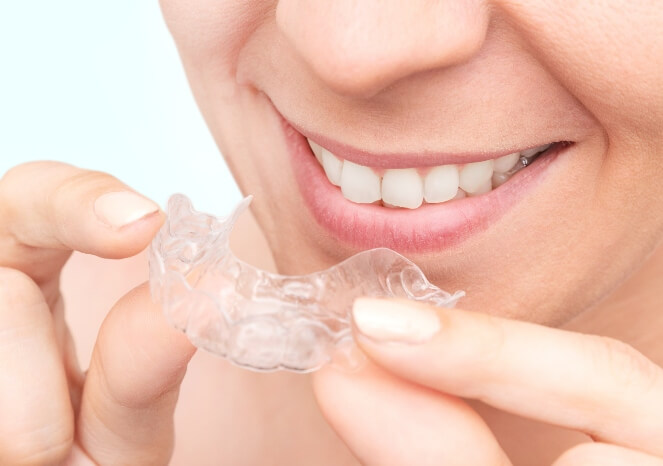When it comes to protecting your teeth from grinding, clenching, or injuries, you may be wondering, "Are over-the-counter mouthguards effective?" The short answer is that while they can offer a basic level of protection, they might not provide the best fit or long-term solution for everyone. Over-the-counter Mouthguards are widely available, affordable, and easy to use, but their effectiveness can vary depending on individual needs and the specific condition you’re trying to address.
What Are Over-the-Counter Mouthguards?
Over-the-counter (OTC) mouthguards are pre-made, mass-produced dental appliances that are typically sold in pharmacies or online. Unlike custom-made mouthguards, which are fitted to your teeth by a dentist, OTC mouthguards are designed to be one-size-fits-all or moldable using a boil-and-bite method.
Types of OTC mouthguards:
- Stock mouthguards: Pre-formed, no fitting required, typically the least expensive.
- Boil-and-bite mouthguards: Softened in boiling water and molded to the user’s teeth for a better fit.
- Comfortable and disposable options: Basic and inexpensive but may offer less protection than other types.
While OTC options are convenient, their fit and comfort may not be as reliable as custom-fitted alternatives, which could affect their overall effectiveness.
Advantages of Over-the-Counter Mouthguards:
Despite their limitations, OTC mouthguards come with several benefits that can make them a viable option for certain users.
Key benefits include:
- Affordability: OTC mouthguards are much cheaper than custom options, making them accessible for those on a budget.
- Convenience: Available at most drugstores and online, they offer an easy, no-hassle solution for immediate protection.
- Variety of choices: OTC options come in different styles and sizes, allowing users to select one that best fits their needs.
- No dental visit required: Unlike custom mouthguards, you don't need an appointment with a dentist to get one.
These factors make OTC mouthguards appealing for those looking for a temporary or less expensive solution to tooth protection, particularly for sports or occasional use.
Limitations of Over-the-Counter Mouthguards:
While OTC mouthguards offer several advantages, they also come with notable drawbacks that can limit their effectiveness.
Common limitations include:
- Poor fit: One-size-fits-all models can feel bulky and uncomfortable, which may lead to difficulty wearing them consistently.
- Reduced protection: A poor fit can lead to less effective protection, especially for teeth grinding or bruxism.
- Lack of durability: OTC mouthguards tend to be made from thinner materials that wear down more quickly than custom mouthguards, requiring more frequent replacements.
- Inadequate for medical conditions: If you suffer from severe bruxism, TMJ issues, or sleep apnea, OTC options may not provide the specific support or protection needed.
A custom-fitted mouthguard created by a dentist may be a better solution if you have more complex needs, such as protecting against severe teeth grinding or TMJ-related jaw pain.
Are Over-the-Counter Mouthguards Suitable for Teeth Grinding?
If you're dealing with teeth grinding or bruxism, you may be wondering if an OTC mouthguard can provide sufficient protection. While OTC Best Mouthguards can help protect your teeth from damage, they may not address the underlying causes of bruxism or provide the best fit for long-term use.
For mild to moderate teeth grinding, OTC mouthguards may offer some protection, but:
- They may not prevent jaw pain or relieve pressure on the temporomandibular joint (TMJ).
- They may wear down quickly, especially with frequent use.
- They lack advanced features like those found in custom options, such as adjusting the positioning of the jaw for better relief.
In cases of severe bruxism, a custom night guard designed by a dentist may be more effective in protecting your teeth and alleviating symptoms.
When Should You Choose a Custom Mouthguard Instead?
Although OTC mouthguards can provide adequate protection for some individuals, they may not be suitable for everyone. If you require a higher level of comfort, protection, or are dealing with specific dental issues, a custom mouthguard may be the better choice.
When to consider a custom mouthguard:
- Severe teeth grinding or bruxism: Custom mouthguards are tailored to fit your teeth and jaw structure, providing more effective protection.
- TMJ or jaw pain: If you're experiencing jaw pain, a custom device can be designed to help alleviate pressure on the temporomandibular joint.
- High-contact sports: If you're participating in intense physical activities, a custom mouthguard offers superior protection against tooth injury and concussions.
- Long-term use: Custom mouthguards are made from more durable materials, offering greater longevity than OTC versions.
While custom mouthguards can be more expensive, they offer superior protection and comfort, especially for those with ongoing dental issues.

